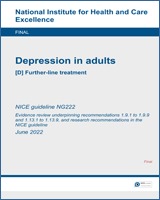From: Further-line treatment

NCBI Bookshelf. A service of the National Library of Medicine, National Institutes of Health.
| Study | Population | Intervention | Comparison | Details of inadequate response/treatment resistance | Comments |
|---|---|---|---|---|---|
|
RCT Korea |
N=103 Mean age (years): 45.6 Gender (% female): 65 Ethnicity (% BME): NR Baseline severity: MADRS 25.54 (more severe) | Aripiprazole 2.5-20mg/day + SSRI | Bupropion 150-300mg/day + SSRI | Inadequate response to 4 or more weeks with SSRIs |
Treatment length (weeks): 6 Outcomes:
|
|
RCT US |
N=1011 Mean age (years): 54.3 Gender (% female): 16 Ethnicity (% BME): 30 Baseline severity: QIDS 16.75 (more severe) | Aripiprazole 2-15mg/day + SSRI/SNRI | Bupropion 150-400mg/day + SSRI/SNRI | Inadequate response (QIDS score ≥16 after ≥6 weeks of treatment or score≥11 after ≥8 weeks of treatment with the 3 most recent weeks at a stable “optimal” dose) to a treatment course with a SSRI, SNRI, or mirtazapine that met or exceeded minimal standards for dose and duration of treatment |
Treatment length (weeks): 12 Outcomes:
|
BME: black and minority ethnic; MADRS: Montgomery-Asberg depression rating scale; NR: not reported; QIDS: quick inventory of depressive symptomatology; RCT: randomised controlled trial; SNRI: serotonin-norepinephrine reuptake inhibitor; SSRI: selective serotonin reuptake inhibitor
From: Further-line treatment

NCBI Bookshelf. A service of the National Library of Medicine, National Institutes of Health.